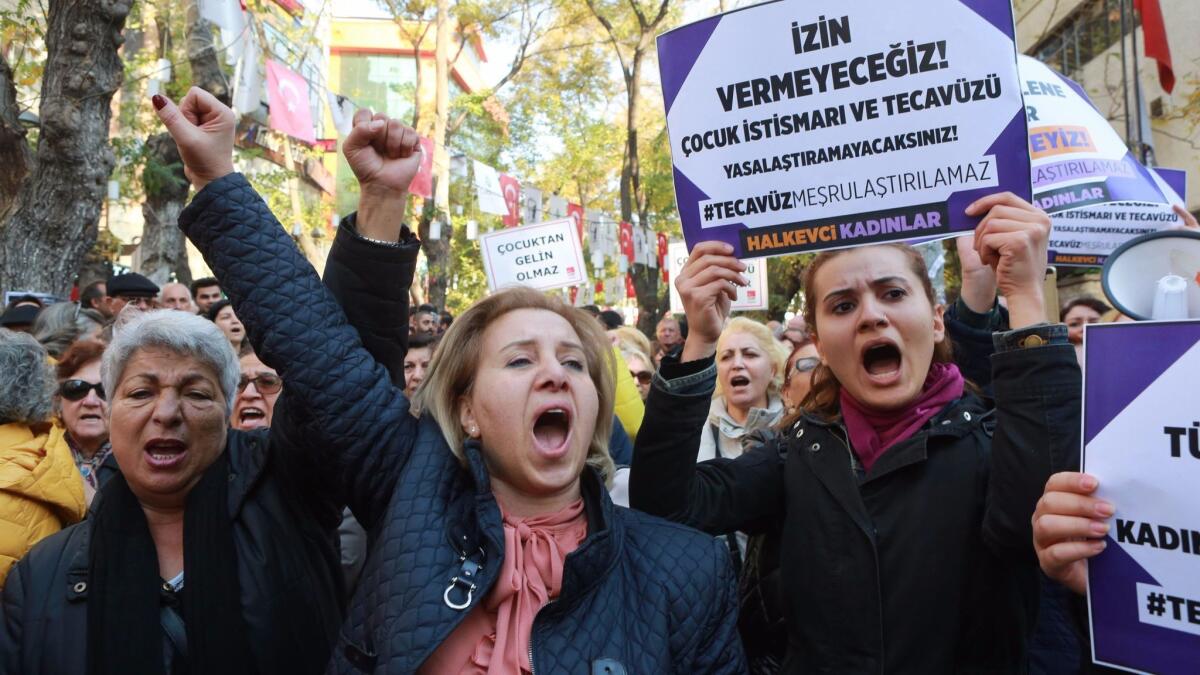Turkey’s parliament to vote on proposal critics say would legitimize child marriages

- Share via
Reporting from Istanbul, Turkey — To lawyer Ceren Akkaya, a proposal by Turkey’s government that would defer sentencing or punishment in some sexual assault cases and which critics say would legitimize child marriages is a disaster waiting to happen.
Akkaya said the proposal, which parliament is expected to vote on Tuesday, puts the burden of proving rape on young women or girls who are typically not in a position to assert their rights. Human rights groups and opposition lawmakers say the proposal would provide amnesty to individuals accused of sexually abusing minors.
“For all of Turkey, if this bill [is] approved, it will really be a disaster,” said Akkaya, a lawyer with Mor Cati, an organization that provides support and shelter for victims of domestic violence.
The proposal, which drew thousands of protesters to the streets across the country over the weekend, calls for deferring sentencing or punishments in sexual assault cases not involving force and where the two people are married.
It says that unless the suspect used “force, threat, deceit, or another way of impinging free will,” sentences for sexual harassment occurring before Nov. 16 would be suspended or postponed if the suspect marries the victim.
It would apply to cases from 2005 to the November cutoff date, amounting to about 3,000 families according to the government, though opposition lawmakers have said the number could be as high as 17,000.
The proposal is part of a bill that would make scores of changes to laws dealing with sexual assault. The ruling Justice and Development Party introduced the proposed law last week.
Under current law, the age of consent is 18 and individuals age 16 or 17 must obtain special permission from a judge to get married. Anyone 18 or older found to engage in sexual relations with someone 15 or younger is automatically charged with a statutory crime.
In 2005, as part of reforms aimed at boosting Turkey’s bid to enter the European Union, the ruling party introduced a set of reforms that closed a loophole that allowed perpetrators of sexual abuse to walk free if they married the victim. Current Turkish law calls for eight to 15 years in prison for anyone convicted of sexual assault and a minimum sentence of 16 years for anyone convicted of rape.
In May, the country’s top court said punishment for offenders should be proportional to the age of the victim. The government, looking to meet a Jan. 13 deadline set by the court, has proposed longer jail times — 18 years for rape -- when the victim is younger than 12, and keeping current sentences in other cases.
Part of that package meant to address the court ruling is the controversial amnesty for child abusers, which the government says is meant to provide relief for people convicted of statutory rape who were involved in a consensual relationship.
“There are children who are married at an early age. Their families do not know the law,” Prime Minister Binali Yildirim said Friday. “The fathers have ended up in prison. This is a one-time measure to correct an unjust situation.”
According to government statistics, judges approved 31,337 marriages, 5.2% of all marriages, in 2015 that involved spouses 16 to 17 years old, with almost all cases occurring in the largely conservative east and south of the country. Marriages involving those younger than 16 cannot be legally registered, so many families opt to only perform a religious ceremony in the largely Muslim country.
According to some women’s rights groups, the actual rate of underage marriages is much higher, and accounts for a third of all current unions in the country. Although the rate has declined over the last decade, UNICEF estimates that 15% of new marriages in 2015 involved girls younger than 18, and 1% involved girls younger than 15.
Opponents of the government proposal say the conditions are prohibitive for many victims, especially underage ones.
“It’s very difficult for anyone to take [a case alleging forced marriage] to court, to say ‘I was forced to marry,’” Akkaya said. “Also, if they are forced into marriage, they are likely forcing the family of the girl too. Under this fear, how can she go and sue the husband? It’s so difficult, even for an adult, even more so if she is so young.”
The proposed law drew a rare rebuke even from women’s organizations close to the ruling party, at a time when the country is politically polarized.
“The perpetrator of sexual abuse has power and opportunities to influence the victim and gain freedom by marrying the victim,” said a statement by the Women and Democracy Assn., demanding a meeting with the government to review the bill.
The organization’s vice president is Sumeyye Erdogan Bayraktar, daughter of President Recep Tayyip Erdogan.
“The victim, on the other hand, is most likely to be forced to marry at an early age under pressure, and be obligated to continue the marriage…. How can the ‘own will’ of such a young girl be identified?”
The State Directorate for Religious Affairs, which has sole authority to appoint the imams that would officiate a union, has repeatedly issued decrees against underage marriage.
In 2013, the organization’s head, Mehmet Gormez, said, “Whoever tries to find an argument or justification [for child brides] in any Islamic source, does injustice both to religion and that girl child.”
In October, it issued a statement saying the practice “shattered the lives of children.”
Farooq is a special correspondent.
More to Read
Sign up for Essential California
The most important California stories and recommendations in your inbox every morning.
You may occasionally receive promotional content from the Los Angeles Times.










